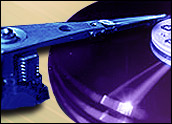
They are the next ballyhooed storage technology: Solid state drives (SSDs) are faster and more energy efficient than their popular siblings, hard disk drives (HDDs). Consequently, many vendors have been touting SSDs as potential replacements for HDDs in laptop systems.
However, reports of the death of HDDs may be a bit premature. While SSDs offer many potential long-term benefits, customers do take a sharp, short-term hit in the pocketbook when they go with SSD options, which generally cost more per GB of memory. Also, because of the nascent nature of SSDs, their functionality and reliability can be sketchy at times.
The end result is that SSDs now represent a miniscule portion of the drives used in laptops. While some experts anticipate a rapid shift in buyer preferences, others are skeptical that they will make significant mark within the next few years.
How HDDs and SSDs Work
The two storage options have different designs. HDDs store information on magnetic platters which rotate at very high speeds. Information is written to and read from the platters by a block of read/write heads. A microcontroller moves the heads. Because data can be stored in different locations on a platter, the time needed to retrieve the information can vary, sometimes significantly. Another problem is these devices rely on many moving, mechanical components, which can become worn down and periodically fail.
In comparison, an SSD stores data in a flash memory chip managed by a microcontroller. While this storage technique has a very low read time, write times can vary and sometimes can slow system performance. Also, there are no moving parts, so it is less susceptible to failure.
SSDs have been around since the 1970s but were mainly only used in niche applications. “Recently, vendors have made progress on the lowering the pricing and improving the performance of SSDs’ raw materials, so they have become a more viable alternative to HDDs,” Mark Peters, an analyst with market research firm Enterprise Strategy Group, told TechNewsWorld.
Filling the Need for Speed
SSDs offer some potential benefits compared to HDDs. “Because in most instances, users read rather than write information, SSDs can be faster than HDDs,” John Rydning, research director of hard disk drives at International Data Corp, told TechNewsWorld.
The lack of mechanical parts often means that SSDs are more durable than HDDs. Other byproducts are lower power consumption, quieter operation, and protection from problems stemming from vibration.
Because of the potential benefits, vendors have been pushing SSDs as the future for laptop drives. The level of interest increased greatly in the past 12 to 18 months, but that push may be self-serving. Storage vendors invested billions to add extra capacity to their factories recently and now are looking for new technologies to drive their usage, according to John Monroe, research vice president at Gartner.
Whether or not the technology makes sense for customers is an open question. In a few select areas, SSDs have gained some traction, but in many markets, they have largely been shunned for a variety of reasons.
How Much Memory Is Enough?
SSDs have trailed and continue to trailing HDD technology in terms of the amount of memory that they can support. Recently, SSD suppliers have begun shipping notebook systems that support 64 GB, 128 GB and 512 GB SSDs. Recently, PureSilicon unveiled an SSD drive capable of storing 1 TB of data.
However, consumers will pay much more per GB when buying an SSD, especially in the higher capacity levels.
A counterpoint to this is the notion that many users already have more storage on their laptops than they need. In most cases, a consumer can carry an operating system, some basic applications and a fair amount data in about 20 GB, which leaves plenty of room for other tasks, if needed. If the benefits of an SSD appeal to a consumer like this, he or she might consider a smaller SSD rather than a similarly price yet roomier HDD.
New = Untested
Another area of concern stems from SSDs’ newness. In some cases, the devices have not been as durable as advertised, forcing users to find replacements. This issue has been fairly common with low-end, inexpensive drives.
Scattershot performance also rears its head at times. In some cases, they perform well consistently but in others, there is lot of fluctuation: random latency, spikes and read/write slowdowns. In addition, some SSDs seem to drain a lot of battery life. In general, newer SSD models are indeed more power efficient than traditional HDDs, while older models need more power.
Suitable for Gaming
As mentioned, the read times are fast, but generally SSDs’ write can sometimes be a bit slower than those of hard drives. Consequently, SSDs are not necessarily the best choice with certain tasks, such as backing up data. However they are good for other applications such as gaming.
Small laptops, (they go by a variety of names — ultrathins, netbooks, etc.) are another area where the new drive option has been promoted. Apple, Dell, HP, and Levono, among others, have begun delivering laptops with SSDs.
However, even in these sectors, the rampup has been slow. Gartner found that less than 1 million laptops used SSDs in 2007. While SSDs have some attractive features, they will remain generally much more high priced — and therefore less popular — than HDDs, even as the market evolves. “We think that 80 percent of the laptops delivered in 2012 will still have HDDs,” Gartner’s Monroe told TechNewsWorld.




















































